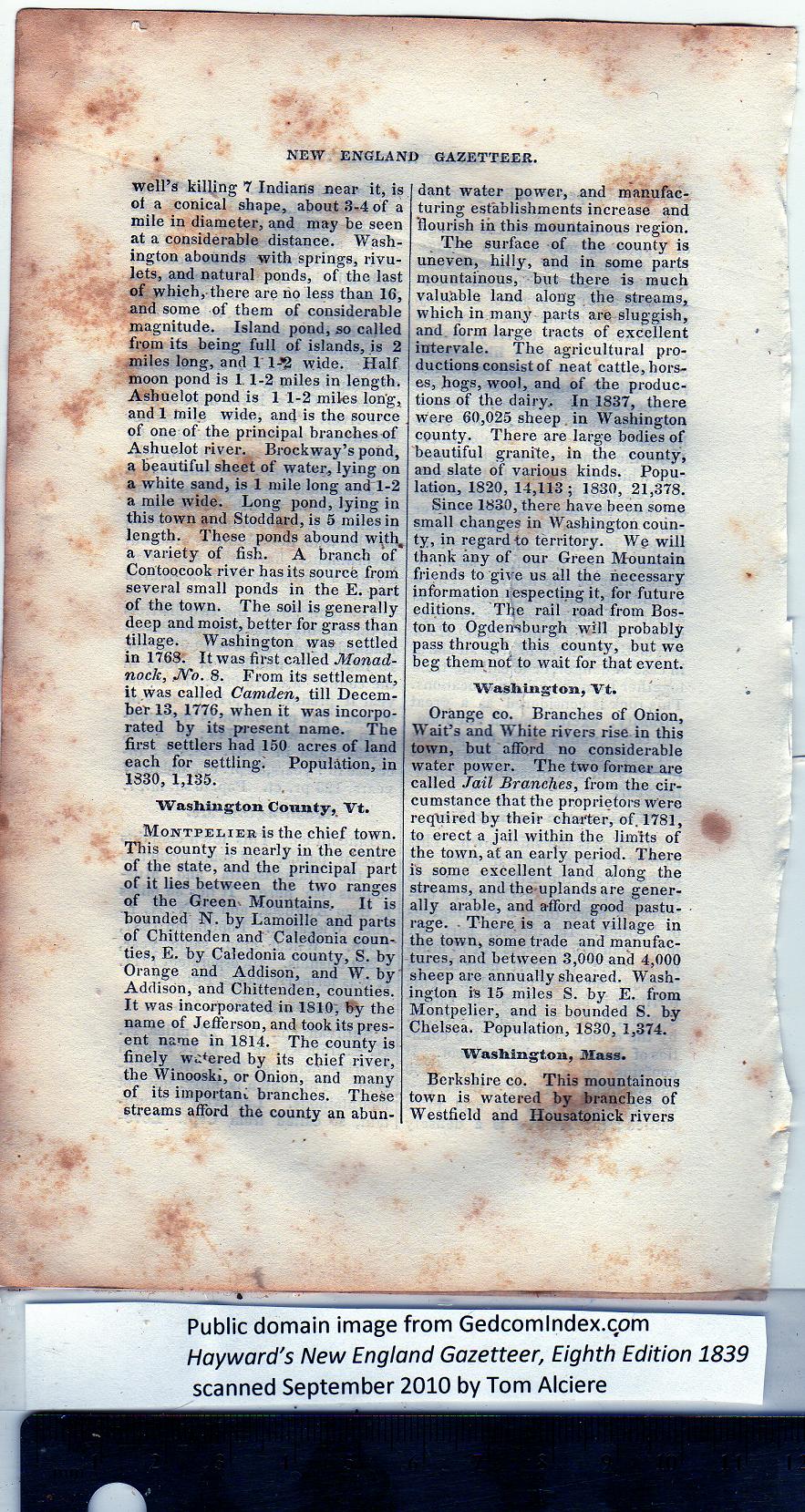|
well’s killing 7 Indians near it, is
ot a conical shape, about 3-4 of a
mile in diameter, and may be seen
at a considerable distance. Wash-
ington abounds with springs, rivu-
lets, and natural ponds, of the last
of which, there are no less than 16,
and some of them of considerable
magnitude. Island pond, so called
from its being full of islands, is 2
miles long, and 1’ l-^ wide. Half
moon pond is 1 1-2 miles in length.
Ashuelot pond is 1 1-2 miles lon'g,
and 1 mile wide, and is the source
of one of the principal branches of
Ashuelot river. Brockway’s pond,
a beautiful sheet of water, lying on
a white sand, is 1 mile long and 1-2
a mile wide. Long pond, lying in
this town and Stoddard, is 5 miles in
length. These ponds abound with,
a variety of fish. A branch of
Contoocook river has its source from
several small ponds in the E. part
of the town. The soil is generally
deep and moist, better for grass than
tillage. Washington was settled
in 1768. It was first called Monad-
nock, JSTo. 8. From its settlement,
it was called Camden, till Decem-
ber 13, 1776, when it was incorpo-
rated by its present name. The
first settlers had 150 acres of land
each for settling.' Population, in
1330, 1,135.
Washington County, Vt.
MorfTPELiER is the chief town.
This county is nearly in the centre
of the state, and the principal part
of it lies between the two ranges
of the Green. Mountains. It is
bounded N. by Lamoille and parts
of Chittenden and Caledonia coun-
ties, E. by Caledonia county, S. by
Orange and Addison, and W. by
Addison, and Chittenden, counties.
It was incorporated in 1810. by the
name of Jefferson, and took its pres-
ent name in 1814. The county is
finely w£*ered by its chief river,
tbe Winooski, or Onion, and many
of its important, branches. These
streams afford the county an abun-
dant water power, and manufac-
turing establishments increase and
flourish in this mountainous region. |
The surface of the county is
uneven, hilly, and in some parts
mountainous, but there is much
valuable land along the streams,
which in many parts are sluggish,
and form large tracts of excellent
intervale. The agricultural pro-
ductions consist of neat cattle, hors-
es, bogs, woo!, and of tbe produc-
tions of the dairy. In 1837, there
were 60,025 sheep in Washington
county. There are large bodies of
beautiful granite, in the county,
and slate of various kinds. Popu-
lation, 1820, 14,113; 1830, 21,378.
Since 1830, there have been some
small changes in Washington coun-
ty, in regard to territory. We will
thank any of our Green Mountain
friends to give us all the necessary
information lespecting it, for future
editions. The rail road from Bos-
ton to Ogdensburgh will probably
pass through tbis county, but we
beg them not to wait for that event.
Washington, Vt.
Orange co. Branches of Onion,
Wait’s and White rivers rise in this
town, but afford no considerable
water power. The two former are
called Jail Branches, from the cir-
cumstance that the proprietors were
required by their charter, of. 1781,
to erect a jail within the limits of
the town, at an early period. There
is some excellent land along the
streams, and the uplands are gener-
ally arable, and afford good pastu-
rage. • There is a neat village in
the town, some trade and manufac-
tures, and between 3,000 and 4,000
sheep are annually sheared. Wash-
ington is 15 miles S. by E. from
Montpelier, and is bounded S. by
Chelsea. Population, 1830, 1,374.
Washington, Mass.
Berkshire co. This mountainous
town is watered hy branches of
Westfield and Housatonick rivers |
